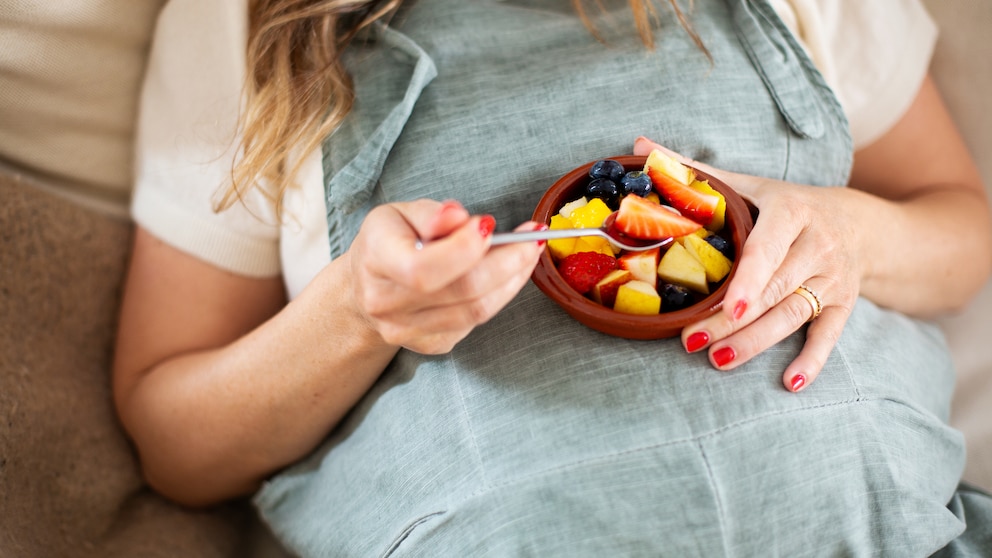January 31, 2025, 4:53 pm | Read time: 4 minutes
What can pregnant women eat, and what should be avoided? There are numerous recommendations – and some myths – about nutrition during pregnancy. Midwife Kathrin Herold explains why caution is advised with certain foods and which tips pregnant women should definitely follow.
Pregnant women often face many questions and uncertainties when it comes to their diet. Kathrin Herold, midwife and representative for breastfeeding and nutrition at the German Midwives’ Association, explains the risks associated with raw milk products, fish, and meat and how expectant mothers can ensure a healthy diet.
Overview
Be Careful with Raw Milk Products When Pregnant
Are raw milk products a no-go during pregnancy? Kathrin Herold takes a different view: “I find it difficult to impose strict restrictions. As a midwife, I want to encourage women to take responsibility for themselves.” At the same time, she warns that listeria – bacteria that are transmitted via contaminated food – pose a risk of infection. A listeriosis infection can cause flu-like symptoms but can also trigger serious complications such as meningitis.
However, Herold emphasizes that not every raw milk product necessarily contains the pathogen. “The woman has to decide for herself whether she wants to take the risk. However, I would not recommend consuming such products.”
Risk of Listeriosis and Toxoplasmosis
As already mentioned, you should be particularly careful when handling raw animal foods during pregnancy – which can result in food-borne infections such as toxoplasmosis and listeriosis. Parasites and bacteria cause these diseases by being transmitted to humans via raw, perishable, or contaminated food. The danger lies in the fact that the pathogens can pass to the unborn child during pregnancy and lead to serious complications (including death).
This Is What the Robert Koch Institute Says
In fact, these cases are rather rare. According to the Robert Koch Institute, around 50 cases of complications caused by toxoplasmosis and listeriosis are registered in Germany each year in around 700,000 births per year. However, it is assumed that the number of unreported cases of toxoplasmosis is high.1
Pregnant Women Should Pay Attention to This with Fish and Meat
Pregnant women should also be careful when eating fish. Herold explains: “We know that many types of fish have very high levels of heavy metals. We need the omega-3 fatty acids and iodine that fish contains. However, in her opinion, these important nutrients can also be replaced by food supplements such as oil or tablets.
She advises against raw fish, for example, in sushi, due to possible infections with salmonella. The toxoplasmosis pathogen is particularly critical in meat. The parasite Toxoplasma gondii, whose main host is cats, triggers toxoplasmosis. “People can become infected by eating raw meat, contaminated food, or through contact with cat feces,” explains Herold.
While toxoplasmosis is usually harmless in healthy adults, an initial infection during pregnancy can have serious consequences for the unborn child. Herold emphasizes: “This pathogen can be found in all types of meat, except beef. So if you eat beef salami, for example, you can avoid the toxoplasmosis pathogen.” Nevertheless, she advises eating raw meat and dried sausage products with caution and always heating meat sufficiently to kill pathogens.
Vegetables Should Be the Foundation of Your Diet
“In my opinion, the most important basis of our diet is vegetables, because they provide us with important vitamins and fiber – especially during pregnancy,” emphasizes Herold and therefore recommends them as the basis of a healthy diet. Fruit supplements the diet but contains a lot of sugar and should therefore only be eaten in moderation.
Pregnant women can use the food pyramid as a guide for a balanced diet: Vegetables and cereal products are at the bottom, with animal proteins and fats above them. Foods that are highly processed and contain a lot of sugar should only be consumed sparingly.

H5N1 Is the Risk of a Bird Flu Pandemic Increasing? This Is What an Expert Says

Nutrition Expert Explains How the Portfolio Diet Works – and Who it is Suitable for

Study from the USA Eating fish during pregnancy can reduce the baby’s risk of autism
Coffee in Moderation, Alcohol Strictly Off Limits
When it comes to drinks, Herold advises caution with caffeine. “Caffeine has an effect on the child, as the child’s liver can only metabolize it slowly. It can take up to three days for the caffeine to be broken down.” Organic, caffeine-free alternatives are a good choice.
When it comes to alcohol, the midwife is clear: “In my opinion, alcohol is strictly off limits. Every drop can harm the child.” She points out that even small amounts of alcohol during pregnancy can cause fetal alcohol spectrum disorders (FASD). According to Herold, myths such as “a glass of wine won’t do any harm” or “cocktails can induce labor” are simply wrong.
Pregnant women should focus on a balanced, vitamin-rich diet and consciously weigh up the potential risks of certain foods. The following applies: The focus should be on personal responsibility, supplemented by sound information and advice from experts.
*with material from dpa

